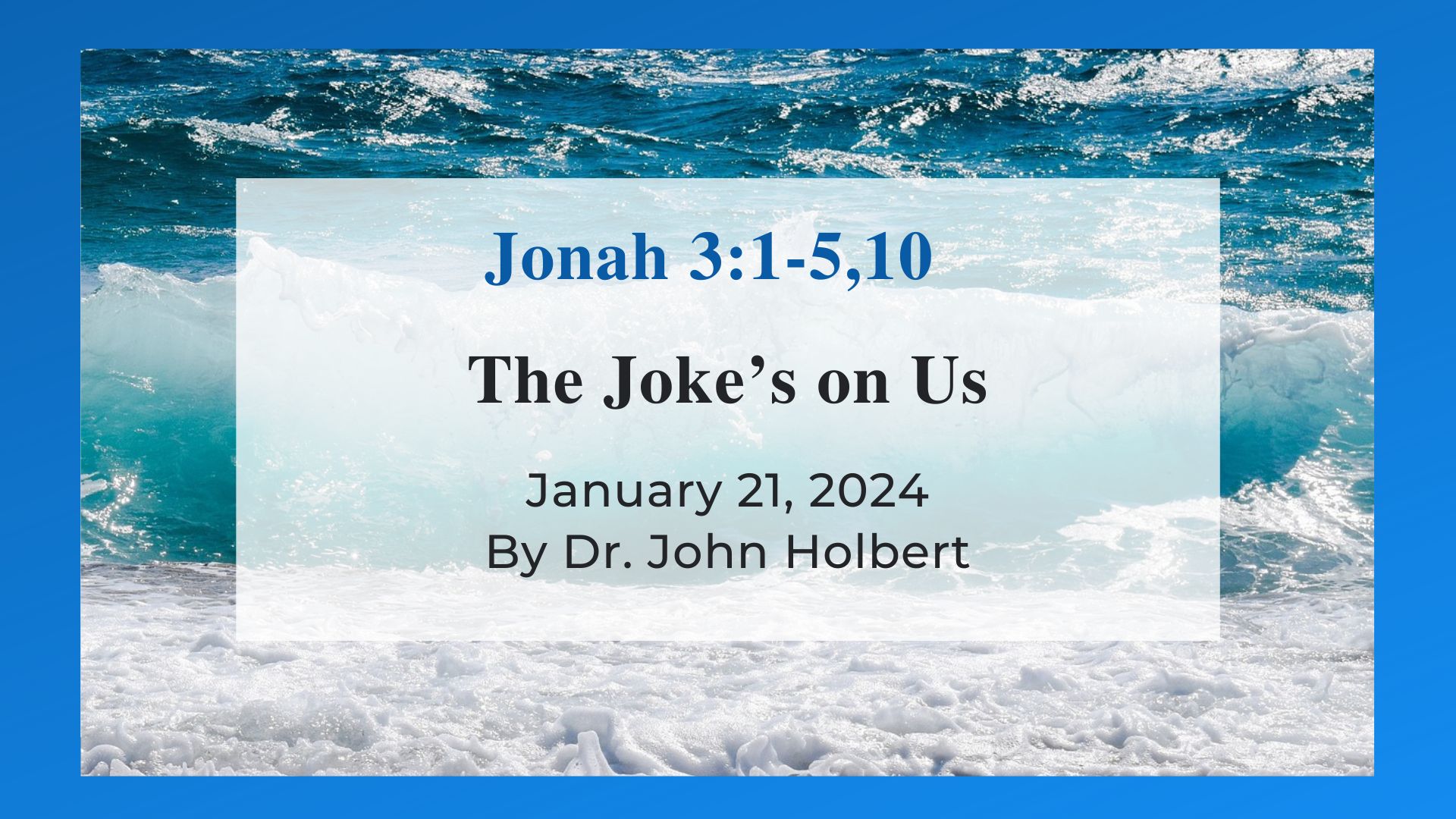The Joke’s on Us - Reflections on Jonah 3:1-5, 10
by Dr. John Holbert on Wednesday, January 17, 2024

The Joke’s on Us
Jonah 3:1-5,10
The Peripatetic Hebrew Bible Preacher
Jonah is the Bible’s best jokebook. It is “Saturday Night Live,” “John Oliver,” and Jerry Seinfeld rolled into one. One simply cannot preach from this book with a straight face or without tongue squarely in cheek. I know that in Judaism, Jonah is always read on Yom Kippur, the day of atonement, and thus one would imagine that on that somber day, a joke book is wildly inappropriate. However, though I am certainly not a Jew, I have spent my religious life in deep engagement with things Jewish, almost exclusively reading the Hebrew Bible from my scholarly perch, and attempting to be attentive to rabbinic commentaries on those texts as I am capable. My perception of my Jewish friends is that they regularly keep their faces less than straight and their tongues ensconced in their cheeks as they go about their religious ways. Hence, a joke book on Yom Kippur may be just the thing! Anyone reading the Hebrew Bible even a little bit realizes quickly that there are in those pages loads of sly and clever, and, yes, funny stuff afoot. The writers of those texts knew all too well that tragedy is laced with comedy, even when, especially when, atonement is called for, either from us or even from God.
And so the book of Jonah tickles our funny bones and throws up for us a mirror of our own funny faces. One brief article can hardly do the thing much justice, but a very brief look at Jonah 3, as the lectionary offers today, can be useful, if not as riotously funny as it needs to be.
Of course, Jonah 3 is in the middle of things. We have already witnessed the would-be but reluctant prophet of YHWH attempt to evade the call of that God to head east to Nineveh, the world’s worst city, by heading south to Joppa to hop aboard a ship bound for Tarshish, which wherever it may be is far west, about as far from Nineveh as he can get. But one hardly gets away from YHWH that easily, since a huge storm hits the sea on which Jonah’s boat is sailing, threatening death to all on board, forcing the terrified sailors, pagans one and all, to pray to whatever or whichever they call gods to save their hides, while Jonah is fast asleep in the hold. Upon being roused from slumber by the furious and horrified captain, Jonah heads up to the deck where the desperate sailors throw dice to discover whose problem this awful storm may be. The dice are clearly loaded and fall right on Jonah. He proceeds to tell them that he is an Israelite and worships YHWH, maker of sea and land. They believe him immediately but try to save his wretched life by tossing stuff into the sea to lighten the boat. But it is no good; the ship is doomed. Jonah then asks them to throw him into the sea, since he knows it is his fault that the storm is so bad. They don’t, but instead row hard to try to save him still. No good! So with a quick prayer to YHWH (they have converted!), they toss him into the sea which instantaneously stops roaring. And when they see that, they are really terrified and begin to sacrifice and make vows, just like full believers in YHWH.
Meanwhile, Jonah is dropping into the sea like a stone. He goes right to the bottom, but before drowning is rescued by a passing great fish, and, blaming YHWH, and proclaiming his great piety in an unctuous poem, is disgorged by the fish, obviously appalled by the hypocrisy of that wretched sonnet! So a second time God speaks to him to get off to Nineveh, but instead of an open-ended invitation to say whatever he wants, is told to “say exactly what I tell you.” God apparently knows what sort of a slippery fellow this Jonah is, and limits him to a 4-word sermon to the Ninevites. Surprise, surprise, the Ninevites all repent and worship YHWH, just like those pagan sailors. Jonah cannot help but convert everyone he encounters to the worship of YHWH! And as a result, “YHWH changes the divine mind about the evil that YHWH had said God would bring to them and did not do it” (Jonah 3:10). In other words, God is in the forgiving business for sure, but Jonah is not.
In Jonah 4, Jonah takes one look at the worshipping Ninevites, and is flatly furious! “YHWH! Isn’t this what I said back in my own country? That is why I left for Tarshish in the first place, because I knew you were a gracious God, slow to anger, and merciful, and chock full of steadfast love, ever ready not to punish” (Jonah 4:2). Translation: I have read Exodus, YHWH, and I know all about who you really are, all-merciful and such. That’s why I did not want to go to this disgusting Nineveh and open my mouth to them because I just knew you would not do your furious stuff against them and now I am going to have to worship with all these repulsive Ninevites! I would rather be dead!
And what about us? Would we rather be dead than worship with all these gay people, and these homeless people, and these Baptist people, and these poor people, and these nasty people, etc., etc.? Maybe it is we who need some of God’s atonement, and what better story to read on Yom Kippur, whether you are a Jew or a Christian, than Jonah?
